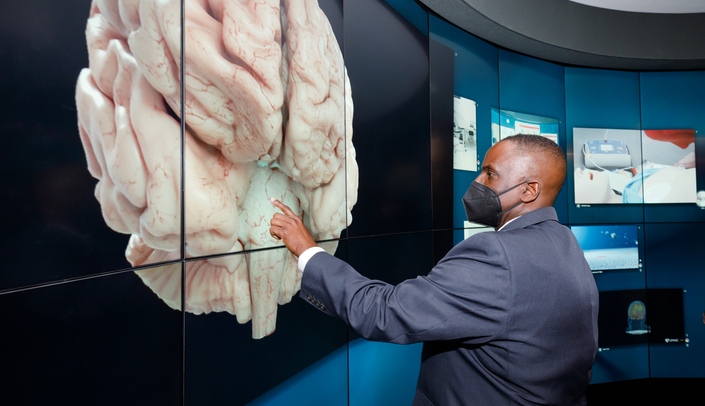During a recent visit to Omaha, the U.S. Department of Health and Human Services Region 7 team praised the work of UNMC and Nebraska Medicine for its national preparedness, collaboration, commitment to sustainability and knowledge sharing.
The HHS team, which included Region 7 Director Joseph Palm, visited the med center campus and toured the Davis Global Center, the national Training, Simulation and Quarantine Center, the Fred & Pamela Buffett Cancer Center and the Nebraska State Public Health Lab. The team also learned more about the National Emerging Special Pathogen Training & Education Center (NETEC), the Regional Disaster Health Response System, Air Force C-STARS Omaha, iEXCEL and UNMC’s nursing and public heath training programs.
"The UNMC/Nebraska Medicine biocontainment and quarantine units are known worldwide because of their work handling patients with Ebola virus disease and COVID-19, but to see it up close is truly impressive," said Palm, who has extensive public health experience. "The foundation for this work, of course, is a first-rate research and clinical care center created by UNMC and Nebraska Medicine.
"This entire operation is an incredible commitment to the security of the United States of America and provides a largely unseen and unheralded security layer for the nation."
HHS officials said the work has:
-
Helped bring more than $500 million in research grants and contracts to UNMC over the past five years.
-
Led UNMC researchers to be part of a federal study on how COVID-19 affects children. (The research will track 20,000 people over four years to better understand long COVID).
-
Secured the campus as one of two pilot sites to develop a regional disaster health response system to build a partnership for disaster health response and enhance HHS National Disaster Medical Systems training and improve medical surge capacity.
-
Led to an agreement with HHS to train upwards of 6,000 public health service officers across the nation, who can then deploy to regions where they may be exposed to such health threats as COVID-19, smallpox and other acute respiratory syndromes.
"The entire nation relies on what has been built here," said Palm, who applauded the staff members who train, and keep training, to handle the worst possible situations. "It’s a task almost no one wants to take on and frankly few places are able to take on. "
CDR Kimberly Davids, PharmD, senior public health advisor for the HHS Office of the Assistant Secretary for Health, said the med center has been a longstanding partner with HHS and a "leader not only for the region but for the nation."
Recently, the med center signed the HHS Health Sector Climate Pledge, to lower emissions and ensure more sustainability and resilience. "The med center is part of a growing movement of organizations that are standing up and committing to action to address climate threats and sustainability programs," CDR Davids said. "Your example gives great energy to those who are starting their journeys to improve resilience and reduce emissions in service of vulnerable populations across the country…the work is essential to meeting the historic challenges of the moment and delivering a healthier future for ourselves, our families and our communities."
Nebraska Medicine was among 61 of the nation’s largest U.S. hospital and health sector companies to pledge to reduce greenhouse gas emissions. CDR Davids encourages other medical systems to sign the Health Sector Climate Pledge, which remains open until Oct. 28.
The med center has long been committed to sustainability programs, said Jennifer Bartholomew, vice president and associate vice chancellor for facilities management for Nebraska Medicine and UNMC. The med center’s current goals, she said, call for net zero energy by 2030. Since 2010, the campus has reported a 22% reduction in net zero emissions (approximately 22,300 homes for a year) while adding more than one million square feet of new facilities. Thanks to deferred maintenance funds awarded through LB384, Bartholomew said the campus will expand the heating hot water capacity of its plant and reduce its reliance on steam, which is less efficient, and replace air handling units in older buildings.
The med center hopes to build collaborations across Region 7, Bartholomew said, similar to those developed by state and federal partners during COVID-19. Region 7 serves Iowa, Kansas, Missouri and Nebraska.
We are Nebraska Medicine and UNMC. Our mission is to lead the world in transforming lives to create a healthy future for all individuals and communities through premier educational programs, innovative research and extraordinary patient care.
